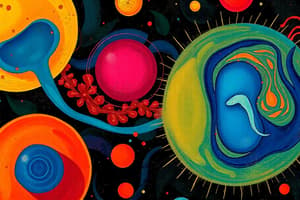Podcast
Questions and Answers
What are the main parts of the male reproductive system?
What are the main parts of the male reproductive system?
Testes, epididymis, vas deferens, seminal vesicles, prostate gland, penis
Where does spermatogenesis occur and what hormones influence this process?
Where does spermatogenesis occur and what hormones influence this process?
Spermatogenesis occurs in the testes under the influence of follicle-stimulating hormone (FSH) and luteinizing hormone (LH).
Which organs make up the female reproductive system?
Which organs make up the female reproductive system?
Ovaries, fallopian tubes, uterus, cervix, vagina
What is ovulation and when does it occur in the menstrual cycle?
What is ovulation and when does it occur in the menstrual cycle?
What happens if fertilization does not occur during a menstrual cycle?
What happens if fertilization does not occur during a menstrual cycle?
What is the process called when a single sperm penetrates the protective layers surrounding the egg and fuses with its nucleus?
What is the process called when a single sperm penetrates the protective layers surrounding the egg and fuses with its nucleus?
Describe the role of the placenta during pregnancy.
Describe the role of the placenta during pregnancy.
What is the term used for the rapid division of the zygote after fertilization?
What is the term used for the rapid division of the zygote after fertilization?
Explain one method other than intercourse that can be used to achieve conception.
Explain one method other than intercourse that can be used to achieve conception.
What is the term for the process where the blastocyst embeds itself into the endometrial tissue?
What is the term for the process where the blastocyst embeds itself into the endometrial tissue?
Flashcards are hidden until you start studying
Study Notes
Understanding Human Reproduction
Human reproduction is a complex process involving both males and females, ensuring the continuity of life through the production of offspring. This process involves various organs and systems working together to create sperm cells and eggs, facilitate their union, and nurture the developing embryo until birth. Let's delve into each aspect of human reproduction.
Male Reproductive System
The male reproductive system consists of several parts including testes, epididymis, vas deferens, seminal vesicles, prostate gland, and penis. Spermatogenesis occurs within the testes where immature germ cells develop into mature spermatozoa under the influence of hormones like follicle-stimulating hormone (FSH) and luteinizing hormone (LH).
Female Reproductive System
In contrast, the female reproductive system includes ovaries, fallopian tubes, uterus, cervix, and vagina. Ovulation is the process by which a woman releases one egg from her ovary during the menstrual cycle. If this egg, also known as an ovum, is fertilized with sperm, it can implant itself in the uterine wall and grow.
Menstrual Cycle
A woman experiences a regular monthly flow of blood due to changes in hormonal levels during her menstrual cycle. During this time, the endometrium sheds its inner layer if fertilization does not occur. Each month, one ovary releases an egg (ovulates), making it available for fertilization.
Fertilization
For conception to take place, ejaculated sperm must travel through the female genital tract where they meet the released egg cell. Fertilization occurs when a single sperm successfully penetrates the protective layers surrounding the egg and fuses with its nucleus. Intercourse is just one method of achieving conception; other methods involve artificial insemination or in vitro fertilization techniques.
Pregnancy
Once fertilization has occurred, the zygote divides rapidly, forming a blastocyst. It then embeds itself into the endometrial tissue, starting the development of the placenta – a temporary organ responsible for nourishing the growing fetus. Throughout gestation, the mother's body provides essential nutrients while hormonal changes maintain the optimal environment for growth and development.
Understanding these aspects of human reproduction is crucial for those seeking to understand their bodies better, plan families, or work in fields related to sexual health and family planning.
Studying That Suits You
Use AI to generate personalized quizzes and flashcards to suit your learning preferences.




